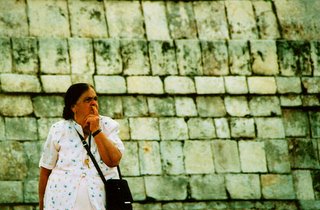it is just at the beginning
that we realize that it might
be the end.
at least we can come to the
realization that what we are
is not what we understand
ourselves to be
but always something greater
always something beyond
what it is that we see.
28 November 2005
16 November 2005
inside-out hoodie.
“The breathing, sensing body draws its sustenance and its very substance from the soils, plants, and elements that surround it; it continually contributes itself, in turn, to the air, to the composting earth, to the nourishment of insects and oak trees and squirrels, ceaselessly spreading out of itself as well as breathing the world into itself, so that it is very difficult to discern, at any moment, precisely where this living body begins and where it ends.”
Sometimes, I don’t understand where I begin and where I end. This, as I have learned in the past, leads to confusion. I think that over the past few weeks I’ve come to understand what confusion means. How mis-communication can put so many things into motion that one never intended to. How it takes not just two sides for a story to be complete, but all sides of a story. I’ve discovered how so incredibly interconnected we all are, on some level or another, groups of friends have so many intricate inner workings that it leaves me in amazement of the human ability to form friendships in the first place. We are constantly trying to understand each other, when sometimes all we need to do is understand ourselves. We want to escape that sort of self-realization that comes with introspective thought in order to think about other situations that are happening. We take ourselves for granted, pretending to know what we are all about, how we will react, when really, each new experience is making an impact us in ways that we don’t fully understand or see when they are happening. Only when we look at the situation from a different perspective, step away from it, can we start to see ourselves as being changed—as growing new branches to reach out to new parts of us—parts we knew were there, but parts we didn’t really [want to] understand.
I’ve felt very connected to people in new ways over the past month or so. Like I said before, I think I’ve gotten to know myself a bit better. But new connections are always a little bit like getting into a hot bath. At first, it is startling, but as you sink into it, it gets better and better. That’s how things have been progressing. Slow at first, but amazingly wonderful as it has moved along. It is a great feeling to really be able to understand—to have a connection that seems to transcend normal understanding. To not only learn about your relationships, but yourself in return, because of those people.
As I get ready to leave in a few months, I’m constantly reminded about how little time I have left here in the States, at least for awhile, and about how little time we seem to have in general. How to squander it is to let ourselves be somehow tricked. I’m feeling very much in the mind set now of “tell everyone everything you want to tell them” don’t let anything pass through your mind that you don’t act on. No thoughts about love. No thoughts about hurt or pain. Not thoughts about fear. Engaging those thoughts in life is what it is all about. Taking charge when it is difficult to do so. Not trying to escape from them, not trying to run away from them or denying them, but acting on them. Talking. Loving. Crying. We’re all in it together.
Sometimes, I don’t understand where I begin and where I end. This, as I have learned in the past, leads to confusion. I think that over the past few weeks I’ve come to understand what confusion means. How mis-communication can put so many things into motion that one never intended to. How it takes not just two sides for a story to be complete, but all sides of a story. I’ve discovered how so incredibly interconnected we all are, on some level or another, groups of friends have so many intricate inner workings that it leaves me in amazement of the human ability to form friendships in the first place. We are constantly trying to understand each other, when sometimes all we need to do is understand ourselves. We want to escape that sort of self-realization that comes with introspective thought in order to think about other situations that are happening. We take ourselves for granted, pretending to know what we are all about, how we will react, when really, each new experience is making an impact us in ways that we don’t fully understand or see when they are happening. Only when we look at the situation from a different perspective, step away from it, can we start to see ourselves as being changed—as growing new branches to reach out to new parts of us—parts we knew were there, but parts we didn’t really [want to] understand.
I’ve felt very connected to people in new ways over the past month or so. Like I said before, I think I’ve gotten to know myself a bit better. But new connections are always a little bit like getting into a hot bath. At first, it is startling, but as you sink into it, it gets better and better. That’s how things have been progressing. Slow at first, but amazingly wonderful as it has moved along. It is a great feeling to really be able to understand—to have a connection that seems to transcend normal understanding. To not only learn about your relationships, but yourself in return, because of those people.
As I get ready to leave in a few months, I’m constantly reminded about how little time I have left here in the States, at least for awhile, and about how little time we seem to have in general. How to squander it is to let ourselves be somehow tricked. I’m feeling very much in the mind set now of “tell everyone everything you want to tell them” don’t let anything pass through your mind that you don’t act on. No thoughts about love. No thoughts about hurt or pain. Not thoughts about fear. Engaging those thoughts in life is what it is all about. Taking charge when it is difficult to do so. Not trying to escape from them, not trying to run away from them or denying them, but acting on them. Talking. Loving. Crying. We’re all in it together.
10 November 2005
08 November 2005
scramble

But to tear down a factory or to revolt against a government or to avoid repair of a motorcycle because it is a system is to attack effects rather than causes; and as long as the attack is upon effects only, no change is possible. The true system, the real system, is our present construction of systematic thought itself, rationality itself, and if a factory is torn down but the rationality which produced it is left standing, then that rationality will simply produce another factory. If a revolution destroys a systematic government, but the systematic patterns of thought that produced that government are left intact, then those patterns will repeat themselves in the succeding government. There's so mch talk about the system. And so little understanding.
-Zen and the Art of Motorcycle Maintenance
Robert M. Pirsig
Among other things from the book so far, this stuck out to me today as I read it on my break at work.
06 November 2005
7,8,9,

so many thoughts running through my head.
running out of breath. understanding that you
are the one that understands what is going on.
i am the one that is going on. my breath
is silent as i wait for you to come around
again and find what it is that you are longing
for. i know it is here. i know you feel it too.
i know. i know. you know. we know.
i, you, we, me, us,
not running away. not running past. not escaping
but letting it overtake.
x marks the spot.
03 November 2005
What we love, we are.

“A classical understanding sees the world primarily as underlying form itself. A romantic understanding sees it primarily in terms of immediate appearance. The romantic mode is primarily inspirational, imaginative, creative, intuitive. Feelings rather than facts predominate. Art as opposed to science.”
--Phaedrus
I tend to have mostly “romantic” friends. It is difficult when they are always making passes. It took me awhile to come to understand what romantic means in terms that are not related, necessarily, to love. To continue on a direction of my previous post, I think that being a romantic is somehow related to nature. But, in contrast, I also think that being classical in thought, is also related to nature. Both areas of thought have different aspects of how they understand nature and the world. The romantic sees the world as beauty, they look at the trees, see the wind, hear the birds, and then they go and write, paint, photograph, talk, discuss, etc. about all of these things. They like to play in the dirt. The classical understanding of nature, from my perspective, tends to be more of an understanding of how nature works, and why it works. Instead of seeing it from the outside, they understand it from the inside. Romantics are not necessarily concerned with the way things work, only that they work. From my understanding though, if we didn’t have the classical people to help the romantics understand life, then the world would just be overrun with people that have a lot of emotional energy and no way to understand it all—there would be SO much art produced that no one would care because everyone would be doing it.
That might be stretching it a little.
When we are young, we are trying to understand the world in terms of being “classical” only we don’t know that’s what we are doing. We want to know how everything works. What it’s made of, how it got there, where it is going etc. But then at some point in our lives our ideas change. Instead of what it’s made of, we ask why it looks the way it does. We talk about our thoughts instead of our toys. Our ideas slowly turn from Ninja Turtles to the color of the turtles and their belts. As I’m writing this I am trying to think of when in my life I came to this understanding of ideas, of feelings and emotions instead of actions and physical things, and for the life of my I can’t remember or think of a time when I had my first “romantic” idea, moment, thought, experience. Shouldn’t that be a turning point in our lives? Shouldn’t that be remembered? When we start to not only understand the world around us, but we start to understand the world around us that we can’t see. Each person’s experience is obviously going to be different. Some early on, some late. Some parents guide their kids towards romanticism early, some still haven’t had their own romantic experiences.
All this to say that romantic and classical people co-exist and without each, it would get to be just a bit too much to bear.
01 November 2005
1,2,3,
Subscribe to:
Posts (Atom)


